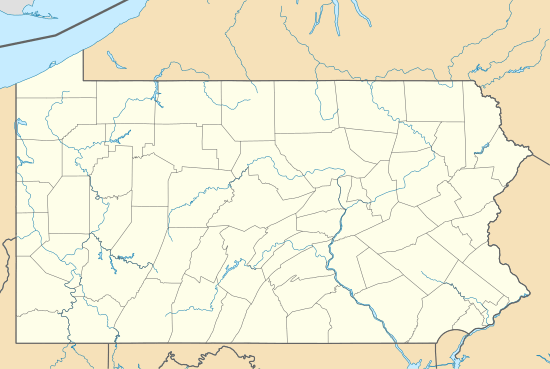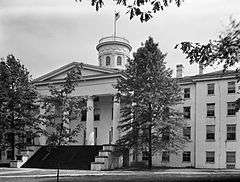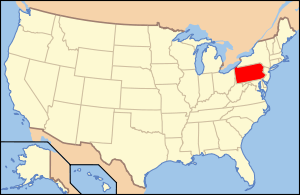Pennsylvania Hall (Gettysburg, Pennsylvania)
|
Pennsylvania Hall, Gettysburg College | |
|
Front of Pennsylvania Hall | |
  | |
| Location | Gettysburg College campus, Gettysburg, Pennsylvania |
|---|---|
| Coordinates | 39°50′6″N 77°14′5″W / 39.83500°N 77.23472°WCoordinates: 39°50′6″N 77°14′5″W / 39.83500°N 77.23472°W |
| Area | 1 acre (0.40 ha) |
| Built | 1837 |
| Architectural style | Greek Revival |
| NRHP Reference # | 72001087[1] |
| Added to NRHP | March 16, 1972 |
Pennsylvania Hall (Penn Hall, Old Dorm) is the Gettysburg College central administrative building and the college's oldest building. Designed in 1835 by John Cresson Trautwine, it was built in 1838 as a "temple-style edifice with four columns in the portico".[2]
During the Battle of Gettysburg in July 1863, Pennsylvania Hall was used as a hospital for wounded troops of the Union and Confederate Armies. The building is also used for the convocation and commencement traditions of entering and departing the college via building.[3]
History
The 1832 "Pennsylvania College of Gettysburg"[4] (now Gettysburg College) initially shared the Gettysburg Academy building on High Street with the Gettysburg Theological Seminary. The college purchased 6 acres (2.4 ha) from Thaddeus Stevens for $528,[5] and the hall with four stories and 150 by 45 feet (46 m × 14 m) was built with a portico on the south side[6]:2–3 and a 24 by 17 feet (7.3 m × 5.2 m) . The hall was the only academic building until the 1847 Linnæan Hall was dedicated as a museum of Natural History (later becoming the chemistry lab then the 2nd academic gymnasium).[5][7]
In the early years of its existence, Pennsylvania Hall contained the students' living quarters, as well as several offices and recitation rooms. At the time of the battle of Gettysburg, the building was the largest building in town.[8] The interior of the hall was renovated in 1869-70.[9]
Battle of Gettysburg
During the American Civil War, Union signal officers used the Old Dorm cupola on June 30, 1863. On July 1, Michael Jacobs, the chemistry and mathematics professor at the college led Union officers to the cupola to observe the battlefield.[6]:4
Battle casualties were treated in Pennsylvania Hall through about July 29 and totaled nearly 700—many who died in the building and on surrounding property.[6]:5–7
Soldiers of both armies were treated in Pennsylvania Hall, as control of the College shifted from Union to Confederate forces on the evening of July 1.
Nearby burials of Union soldiers were reinterred in the Gettysburg National Cemetery in the autumn and winter, and Confederate burials were reinterred in the southern cemeteries, primarily in Hollywood Cemetery (Richmond, Virginia).
Pennsylvania College resumed classes on September 24, 1863. Bullets, bones, human remains and bloody books were found in and around the building for many years after the end of the battle.[6]:20–1
Post-war
The Pennsylvania Hall interior was again renovated in 1889[9] and in 1928, and a United States tablet was erected in Old Dorm in 1932 (the "white-painted Gettysburg College building"[10] was the "base hospital" for the 1938 Gettysburg reunion.)[11] A structural renovation of Pennsylvania Hall began January, 1969, to maintain the stability of the exterior walls, roof, and cupola with steel columns, girders and 5 concrete reinforced slabs (1 for each floor, including the attic).[9] During the renovation, numerous artifacts of historical significance were recovered from behind walls and under floors.
Pennsylvania Hall was listed on the National Register of Historic Places in 1972.[1]
Current use
Today, Pennsylvania Hall contains the main administrative offices of Gettysburg College. The offices of the college's president and provost are located in the building, as well as the human resources and financial services departments.[12]
See also
|
| |
|
|
References
- 1 2 National Park Service (2010-07-09). "National Register Information System". National Register of Historic Places. National Park Service.
- ↑ Gilchrist, Agnes Addison (1958). "A Trautwine Building Identified". Journal of the Society of Architectural Historians. 17 (3): 32–33.
- ↑ "Traditions". Commencement. Gettysburg.edu. Retrieved 2011-11-22.
- ↑ Beitel, Calvin Gustavus (1874). A Digest of Titles of Corporations Chartered by the Legislature of … (Google books). J. Campbell & son. Retrieved 2011-11-22.
- 1 2 "Milestones in Gettysburg [College] History" (Google News Archive). The Gettysburg Times. Times and News Publishing Company. May 26, 1932. Retrieved 2011-11-22.
- 1 2 3 4 "The College Hospital: Pennsylvania College and the Battle of Gettysburg," Craig Schneider, Gettysburg College: 2007.
- ↑ "National Historic Landmarks & National Register of Historic Places in Pennsylvania" (Searchable database). CRGIS: Cultural Resources Geographic Information System. Note: This includes Pennsylvania Register of Historic Sites and Landmarks (July 1971). "National Register of Historic Places Inventory Nomination Form: Pennsylvania Hall" (PDF). Retrieved 2011-12-08.
- ↑ "Gettysburg College Civil War Tour: Gettysburg College and the Battle of Gettysburg," Page 8, John Rudy, Gettysburg College: 2007.
- 1 2 3 National Register of Historic Places Inventory - Nomination Form, p.2
- ↑ "Throng at Gettysburg Hears Roosevelt Call For Peace Campaign". Reading Eagle. July 4, 1938.
- ↑ "Here and There with the Vets" (Google News Archive). Star and Sentinel. July 9, 1938. Retrieved 2011-02-12.
- ↑ "Adams County". Journey Through Hallowed Ground. HallowedGround.org. Retrieved 2011-11-22.
External links
- Pennsylvania College, Pennsylvania Hall, Gettysburg Borough, Adams, PA at the Historic American Buildings Survey (HABS)
- http://visitpa.com/visitpa/details.pa?attractionId=215594


